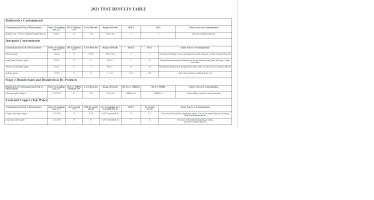rtstrider
Well-Known Member
- Joined
- Dec 12, 2016
- Messages
- 1,192
- Reaction score
- 717
Hey all! I was looking to see if anyone had experience with brewing using unfiltered tap water? A few breweries in my area use this and it seems to be ok. Now there are chlorine/chloramines in the water so all water that touches the beer will be treated with Campden. The mash PH will be corrected to the 5.25-5.4 range. Took a sample yesterday and the unfiltered, cold side, of the tap came in at 35 TDS. Also the PH came in at 7.7. Any type of soft hose will be taken out of the process this time around to remove any hose flavors from the equation. Will only use water coming from metal pipes/faucets since there aren't any of the rv hoses/charcoal water filters on hand. Will be using either the outside faucet (no hose so straight from the faucet), or cold side sink water using the faucet only (not the sprayer) filling up a 5 gallon bucket to transfer the water to the brewzilla and stove top pots (sparge water). The city water report doesn't say much I understand other than the water is safe/acceptable to drink.
With that said my typical process is to go across the street to the RO machine which measures between 1-3 TDS as it's maintained every two weeks, fill up with 10 gallons, then come home and build a water profile from scratch. Seeing as the RO machine has more than doubled in price I'm looking for cheaper/alternative means. Speaking with a few local head brewers sparked this idea and brought out a wild hair to just give it a go and see what happens. The brewers are actively winning regional awards on the pro level which makes me think they may be on to something lol Anywho a copy of the water report is attached. It's from 2021 but that's all I've got. Any input would be greatly appreciated!
Edit: Forgot to mention will be doing a test run on Saturday with a blonde ale to see how it turns out. It may be worth just sticking it out with the RO machine across the street as it's still significantly cheaper/faster than maintaining a setup here at home. Figured a light ale would be a decent test to see if anything sticks out.
With that said my typical process is to go across the street to the RO machine which measures between 1-3 TDS as it's maintained every two weeks, fill up with 10 gallons, then come home and build a water profile from scratch. Seeing as the RO machine has more than doubled in price I'm looking for cheaper/alternative means. Speaking with a few local head brewers sparked this idea and brought out a wild hair to just give it a go and see what happens. The brewers are actively winning regional awards on the pro level which makes me think they may be on to something lol Anywho a copy of the water report is attached. It's from 2021 but that's all I've got. Any input would be greatly appreciated!
Edit: Forgot to mention will be doing a test run on Saturday with a blonde ale to see how it turns out. It may be worth just sticking it out with the RO machine across the street as it's still significantly cheaper/faster than maintaining a setup here at home. Figured a light ale would be a decent test to see if anything sticks out.
Attachments
Last edited:



